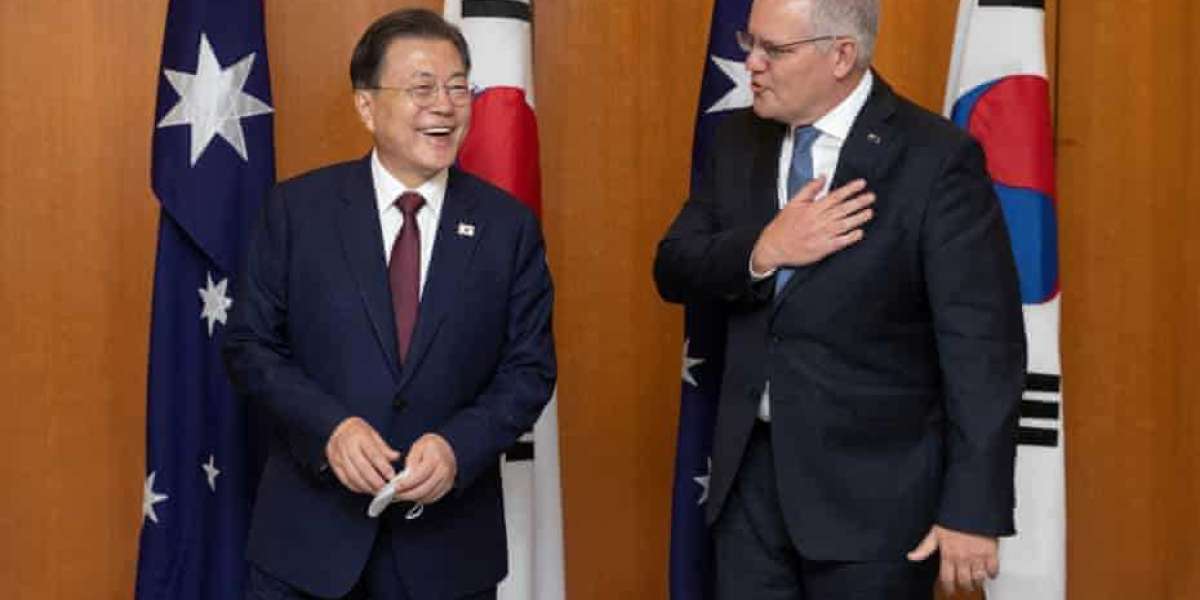Immediately following the conclusion of Monday's summit between the leaders of South Korea and Australia, President Moon Jae-in and Prime Minister Scott Morrison signed a joint declaration on territorial issues in the South China Sea.
According to a joint statement signed by the leaders of Australia and South Korea, "as significant maritime trade states, Australia and South Korea acknowledge that security in the Indo-Pacific is dependent on respect to international law in the maritime domain, particularly in the South China Sea."
The South China Sea is a marginal sea in the Western Pacific Ocean that borders the country of China. The Chinese government asserts sovereignty over the vast majority of the sea and is adamantly opposed to outside interference, despite opposition from its neighbors and a court judgment against it at The Hague.
Tensions between China and the United States have lately risen as a result of concerns expressed by the United States and the European Union over China's breach of international law in the sea, which has resulted in high-level meetings. After China deployed water cannons on two Philippine supply boats that were about to enter the sea, the United States cautioned that it could be necessary to invoke a mutual defense pact.
Both presidents stressed that issues must be settled peacefully and in compliance with international law, particularly the United Nations Convention on the Law of The Sea, according to a joint statement released by their respective governments.
Moreover, they emphasized the significance of sustaining freedom of navigation and overflight, and they decided to increase cooperation in order to defend these values, which must not be weakened in the context of rising dangers of instability in the maritime domain.
President Moon, who on Monday expressed his disapproval of the diplomatic boycott of the Beijing Winter Olympics, appears to be on the side of Australia when it comes to the dispute over maritime sovereignty in the South China Sea.
Australia is the most important ally of the United States, participating in the AUKUS, Quad, and Five Eyes alliances, which the United States leads in order to keep a check on China. In a joint news conference held on Monday, Morrison said that the member countries of the Association of Southeast Asian Nations should be entitled to make their own economic decisions, particularly when it comes to the sea.
Aside from that, the two leaders pledged to work toward achieving peace on the Korean Peninsula.
"Leaders reaffirmed their shared commitment to the complete denuclearization of the Korean Peninsula and the establishment of permanent peace on the Korean Peninsula, in accordance with previous agreements such as the 2018 Panmunjom Declaration, the Pyongyang Joint Declaration, and the Singapore Joint Statement," according to the statement.
They also urged for the full execution of relevant United Nations Security Council resolutions by the international community, including North Korea, as well as sanctions against the regime in Pyongyang.
In addition to security concerns, the Comprehensive Strategic Partnership Joint Statement calls for further collaboration in the areas of business, technology, health, and the promotion of intercultural exchanges and exchanges.
In their agreement, they pledged to work together to advance clean hydrogen cooperation, with a particular emphasis on trade and supply chain development, infrastructure support, expanding use in the transportation and power sectors, institutional agreements, enabling regulatory and skills reforms, and institutional agreements.
The two countries will further up their collaborative efforts to guarantee the stability of the supply chain for vital minerals and allied goods. They also agreed to work closely together in the areas of earth observation and imagery obtained by satellites.


